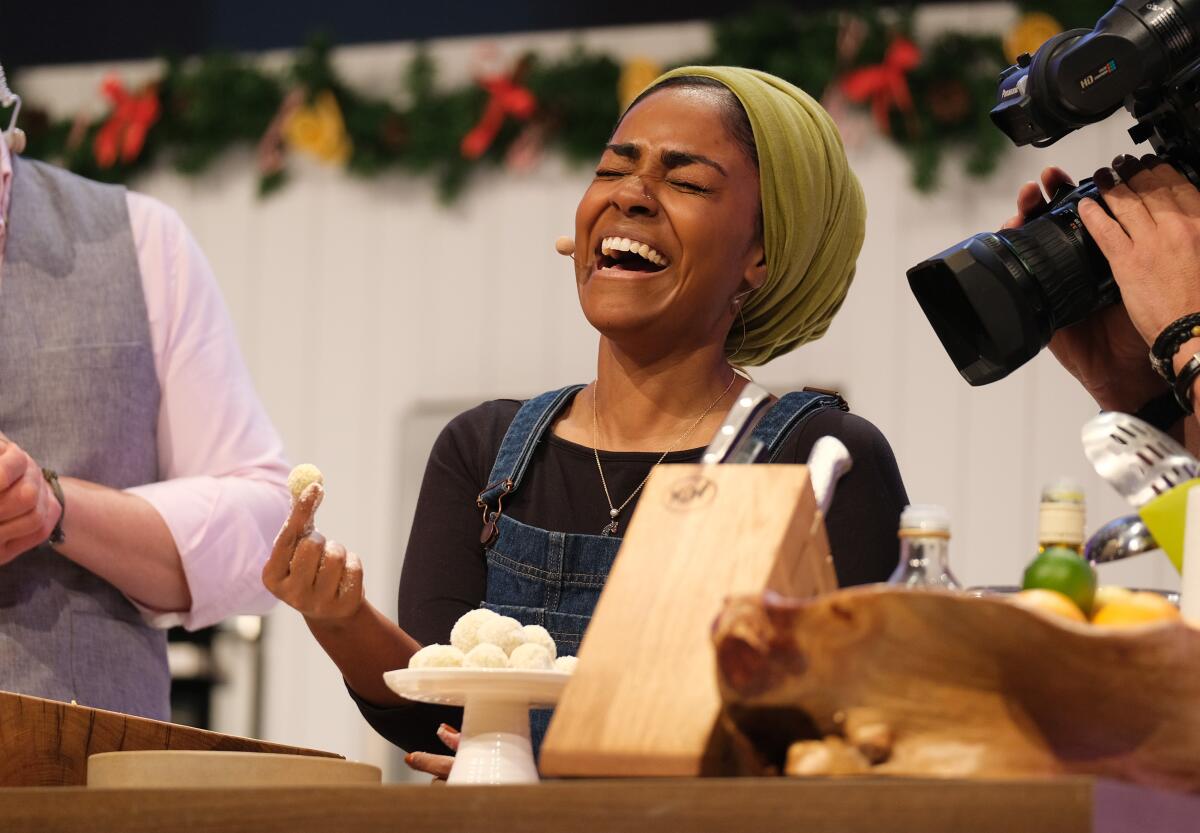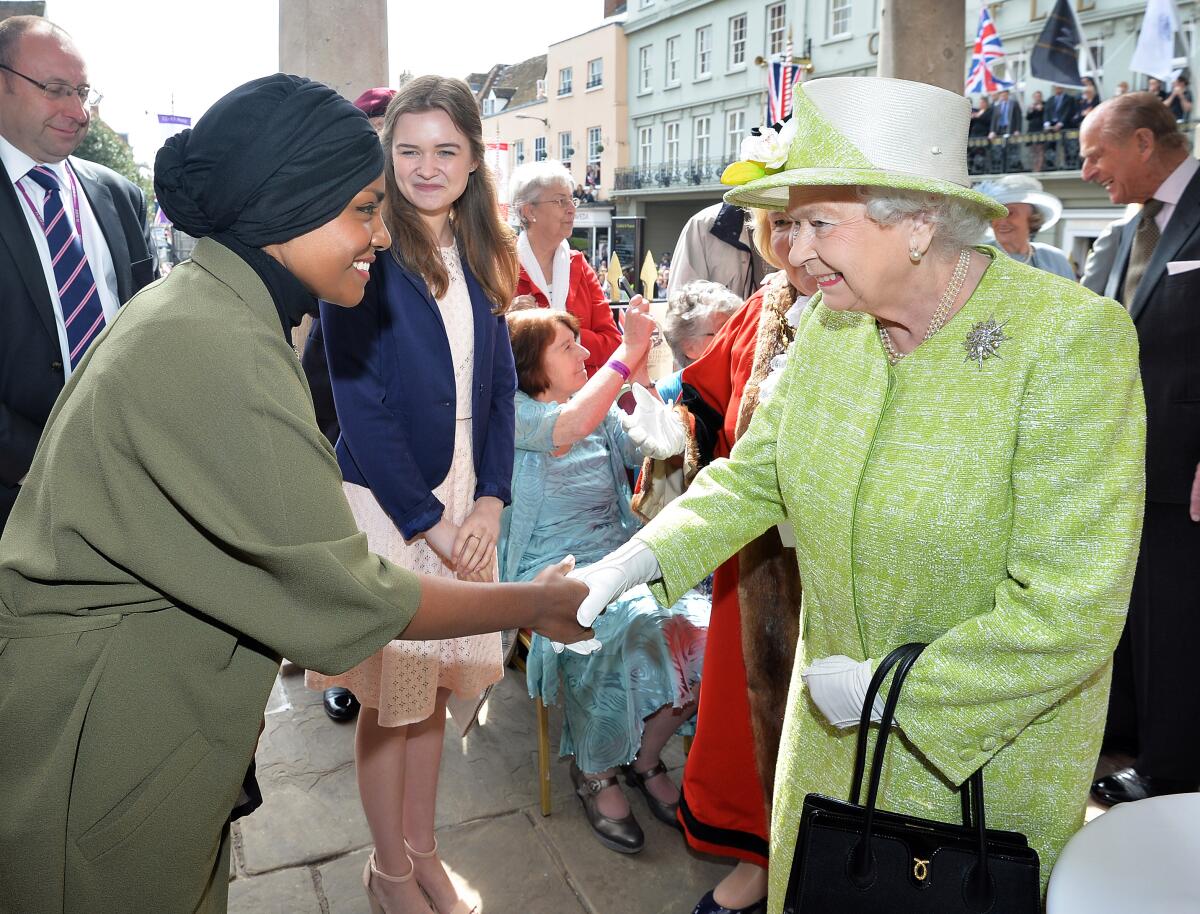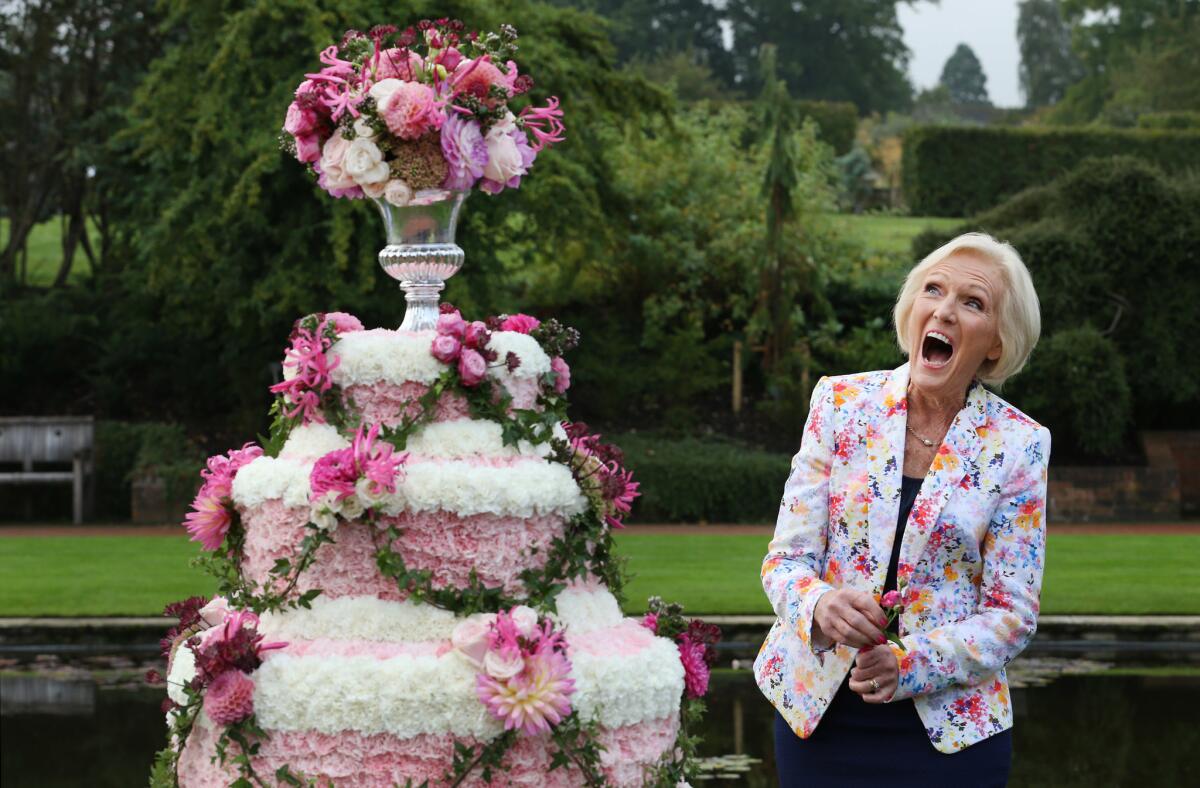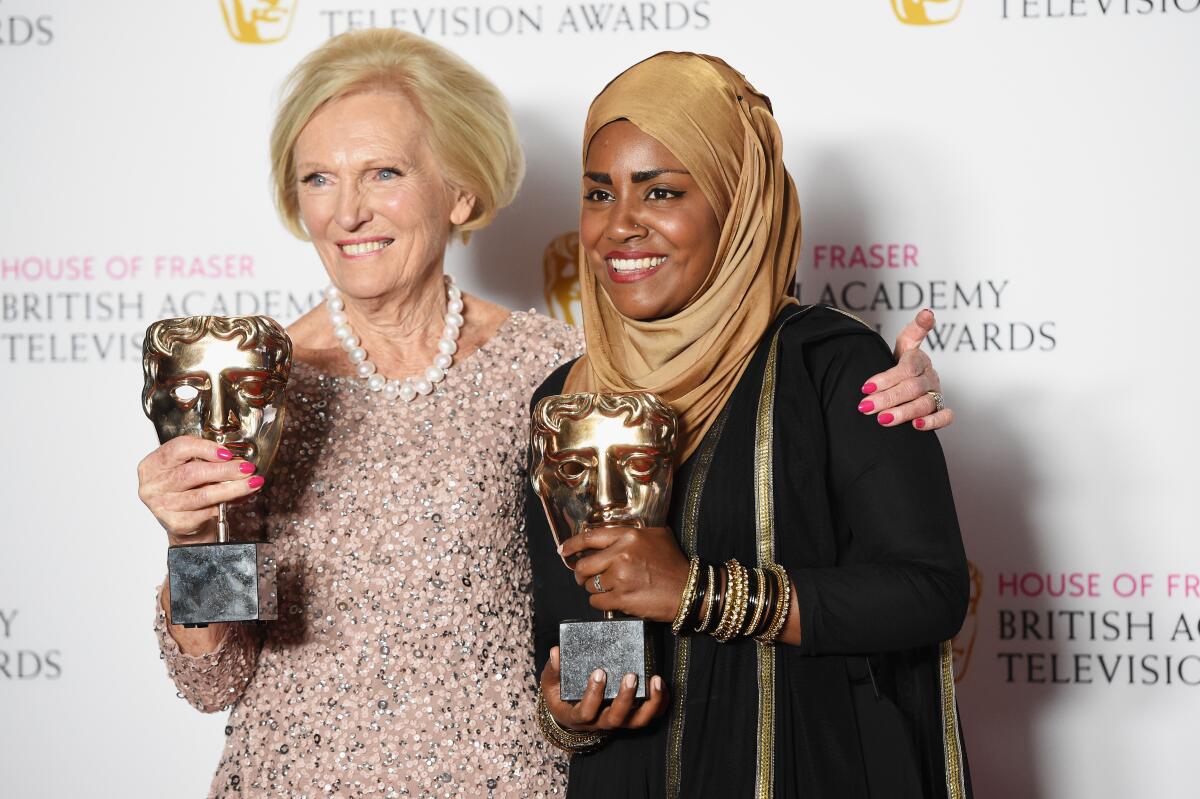She won over a nation on ‘Great British Bake Off.’ Now she has her own Netflix show
- Share via
Nadiya Hussain was a 30-year-old stay-at-home mom with three kids when her husband decided to submit an application on her behalf to “The Great British Baking Show” — a whim that would ultimately transform her life. Not only did Hussain make the cut but she also eventually won the hugely popular competition show in 2015, charming most of the United Kingdom — including then-Prime Minister David Cameron — in the process.
Hussain, who is Muslim and wore a hijab on the show, won over viewers with her quick wit, exuberant facial expressions, inventive recipes and, most of all, her powerful story. In a tearful acceptance speech that ranks with Sally Field’s “you like me, you really like me” moment, Hussain declared, “I’m never gonna put boundaries on myself ever again. I’m never gonna say I can’t do it. I’m never gonna say ‘maybe.’ I’m never gonna say, ‘I don’t think I can.’ I can and I will.”
She became an instant media darling and, in the five years since winning over the judges on “The Great British Bake Off” (as the series is known across the pond), she has become a multimedia star, hosting multiple cooking shows and writing cookbooks, newspaper columns, children’s books, a memoir and novels. She baked Queen Elizabeth’s 90th birthday cake — orange drizzle with orange curd and orange buttercream — became an advocate for mental health and has spoken movingly about the discrimination she’s faced as a Muslim.
And now Hussain, 35, has a well-timed new series for Netflix, called “Nadiya’s Time to Eat,” where she shares some of her favorite time-saving recipes — think trays of baked pancakes or pasta sauce made from cooked beets — and also meets with some of the people who harvest and process her favorite ingredients. Filmed in cheerful colors and infused with Hussain’s unfussy spirit, it may help ease your longing for a new season of “The Great British Baking Show.”
“It’s a really good time to make something that makes people feel good,” Hussain said recently from her home in England, where she’s holed up with her three home-schooling kids, ages 9, 12 and 13. “I’m holding up surprisingly well. I’m not always 100%, but that’s to be expected.”
The following has been edited for clarity and condensed.
The secret ingredient of ‘The Great British Baking Show’ is home economist Faenia Moore: “It would be helpful to be clairvoyant in my job,” she says.
This show is very well-timed to a moment when many people, especially parents, are trying to wing it in the kitchen. But what was the original impetus behind it?
It was about the way I cook. I am always thinking, “What are we eating next week?” I might make pancakes on the weekend, but I would double the recipe and stick it in the freezer ready for the following weekend, so I don’t have to make the same batter twice. If I’m cooking one week, I’m not cooking the next. So it frees you up to do other things. I love being in the garden. I love embroidery, painting. It’s also about not being snobby about tinned ingredients. There’s nothing wrong with tinned potatoes and cheats and hacks.

Is there anything you’re making now while self-isolating that’s unusual?
I put this on my Instagram and everyone thought I was mad, but… banana peels. I’ve eaten banana peels my whole life. As soon as we went into lockdown, I was like, “You know what? I’m going to share this recipe because I reckon there are dozens of people who are throwing banana peels in the bin.” You just get a bit of garlic, a bit of onion, a bit of barbecue sauce, a bit of ketchup and then you wack it on a burger bun, put some cheese on, grill it in the oven and you get delicious barbecue pulled chicken burger thing.
Lots of people ask me are my recipes drunk recipes, but I don’t drink. But I love that when I make something people think I’m a little bit mad. And I like proving them wrong. It’s something my granddad used to cook. He was a farmer, and they never threw a banana peel away. Once he’d had his banana, he’d cook that and eat that. I think we have to step back and think about what we throw away and think, “Can I use that?” And chances are you can.
Your victory speech still makes me cry. You must get that a lot.
I do. People ask me, “Did you practice it, did you know you were going to win?” I cried for 20 minutes, and those were the words that came out. That’s why people feel connected to it. I did something that I never dreamed I would do and I won. And that was bigger for me than just cake.

“The Great British Baking Show” has angered Goths everywhere — and taken another of its increasingly gimmicky turns — by eliminating fan favorite Helena Garcia.
What drove you to apply in the first place? It’s a lot of work just to apply.
My husband was the one who did the application. I don’t know why he thought putting me on the biggest baking show in Britain would solve my anxiety. If anything, it made it worse. But it allowed me to see that I can achieve anything that I want to. Apart from having my children, it was the first thing I’d done myself. Even then I needed my husband.
How do you manage your anxiety now, especially after going from anonymity to being a famous person?
Anxiety is always going to be a part of my life. I get to meet amazing people and do some crazy, crazy things that I never imagined in my wildest dreams I would ever do. But I also have the reality of coming home and cleaning my own toilet. I think that’s what keeps me sane. When [my sister] knows I’m coming over, she says, “I’ve left all the dishes for you.” And I do all her dishes and I love cleaning her worktop, giving it a good shine. She finds it hilarious. But it reminds me of what’s important.

Who is more intimidating to cook for, Mary Berry [former “Baking Show” judge] or Queen Elizabeth?
I might have perspired in equal measure when cooking for the queen and for the queen of cake. My daughter actually thinks that Mary Berry is the actual queen, so when I made the cake for the queen, she said, “You’ve already baked for the queen, Mum.” I said, “No, I haven’t. Mary Berry isn’t the queen.” She said, “Yes, she is.”
When you bake for her, they must tell you what she likes. Did you get a brief?
Nothing. They just said that I can’t make fruitcake because somebody presented her with a cake and she couldn’t cut through the fruitcake because it was so solid, like concrete. So in the end I did a lovely orange drizzle cake. I had done a lemon drizzle for Mary Berry and the kids said, “Why don’t you just do orange drizzle?” It was as simple as that. I get a lot of advice from my kids.
Proving that everything good and pure in this world will one day be snatched from us, the news broke this week that Mary Berry, the improbably named, immaculately coiffed cookbook author who has served as a judge on “The Great British Baking Show” since its inception in 2010, will be leaving the series.

Is there anything that goes on behind the scenes on “The Great British Baking Show” that people would be surprised about?
What you don’t see on the floor are the runners and the production team who literally crawl and drop sandwiches off under your bench, and they leave cups of tea and say, “Can I take the dishes away? Do you need anything?” So there are people hiding and feeding you while you’re baking. I wish in my life while I was cooking and baking somebody would do that for me, but nope.
A lot was made of the symbolism of you, a Muslim woman, winning “The Great British Baking Show.” Did you think about it like that?
When I was on the show, I didn’t really think about the fact that I was a Muslim. I don’t think about my religion all day, every day. It’s just who I am. It was only when it was televised and people knew I was a contestant on “Bake Off” and I started to read some of the negative comments. That’s when I realized it might not be as easy as I imagined it would be, and that, for me, was a bit of shock. I think if you’d asked me five years ago, “Talk to me about your religion,” I would have said, “Let’s just talk about cake, please.” But five years on, I understand the value of being a Muslim woman in broadcasting, a Bangladeshi woman of color who writes books and is on television where people can see me.
It’s Ramadan right now. I proudly talk about the fact that I don’t eat breakfast or lunch. I wait to eat until I have dinner. If you’d asked me five years ago, I would have said I don’t want to talk about it.

You also spend some time in “Time to Eat” visiting with people who make the ingredients, who source and manufacture it. What inspired that aspect of “Time to Eat”?
I am the granddaughter of a farmer, so I like to know where things came from. I lived with my granddad for eight months in Bangladesh. I learned his trade. He used to harvest pink rice. And he was a buffalo farmer. He raised them for their milk and occasionally their meat. If you wanted to eat dinner that night you had to run around the farm, grab the chicken and kill it yourself. That is something that has always been with me. I always tell my children that animals have to die for you to eat it. You have to understand the process from start to finish.
What’s your favorite shortcut ingredient?
It sounds crazy, but tomato soup. I always have tomato soup in the house, so if I want to create a tomato-based curry, I’ve got tomato soup and it’s really packed with flavor. It’s sweet and tangy and tart. It’s lovely and thick. If you want to do a quick thing of pasta, add some herbs. And it makes a really good chocolate cake. There’s a stigma attached to canned foods. It feels like it’s a poor man’s food, but it’s not. I loved tinned potatoes. When you’re in a rush and you want to make a quick potato salad, you have to peel the potatoes, cut them, boil them. Or you could just crack open a can.
More to Read
The complete guide to home viewing
Get Screen Gab for everything about the TV shows and streaming movies everyone’s talking about.
You may occasionally receive promotional content from the Los Angeles Times.







